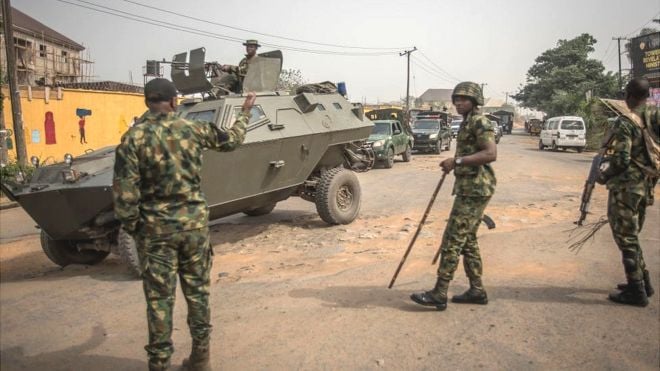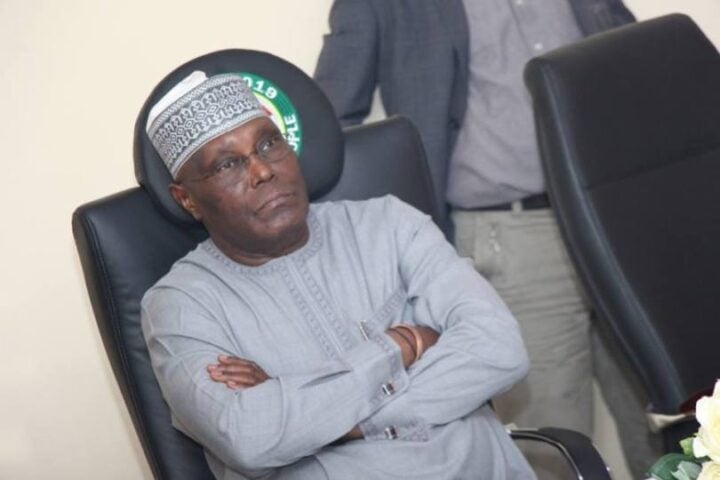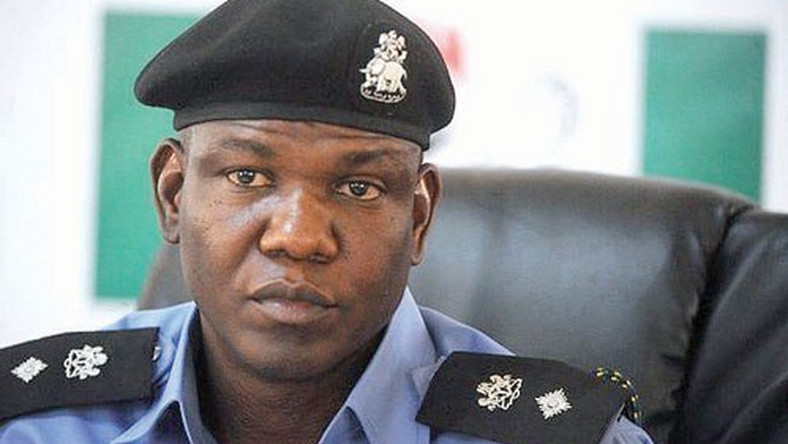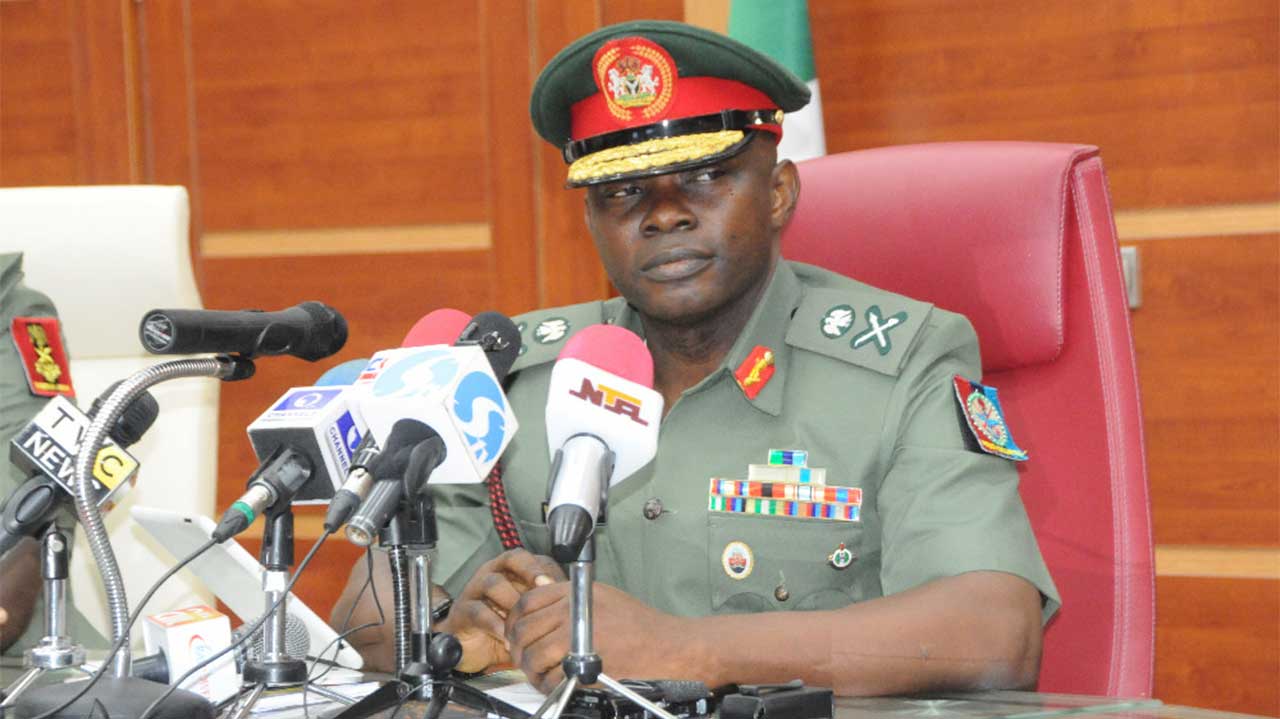File photo of Nigerian soldiers
BY GABRIEL GIWA
The security architecture in Nigeria has been questioned in recent times. In some quarters, questions have been raised as regards the constitutional role of the Nigerian Police as well as that of the Nigerian Army. They have also questioned the involvement of the Nigerian Army in enforcing law and order in the society as against its constitutional role of protecting the territorial integrity of the country from external aggression.
I have looked at the involvement of the Nigerian Army in internal security in the country and came to the conclusion that without the participation of the Army in civil security, Nigeria would have been a banana republic where all would not be safe, and the nation would have been in phenomenal crisis with the threats posed by militant groups like the Indigenous People of Biafra (IPOB) the Islamic Movement in Nigeria (IMN) and other forms of civil unrest experienced in the polity in recent times.
It must be expressly stated that the Army has always been called upon to restore law and order when the incapacity of the Nigerian Police is exhibited. A good example was the Maitatsine crisis in Northern Nigeria in the ’80s led by Muhammadu Marwa, a Cameroonian residing in Kano who opposed the Nigerian state.
Advertisement
By December 1980, the Yan Tatsine attacks on other religious figures and Police forced the Nigerian Army to become involved. This is just one instance that the involvement of the Nigerian Army saved the day. There are also abound several cases where the Nigerian Army has always been called upon to save the day due to the inefficiency of the Nigerian Police Force in living up to its role of ensuring peace and orderliness in the country.
I am one of those that have stated that if the task of internal security is left for the Nigerian Police alone, Nigeria will go up in flames and we would all have our selves to blame. Without mincing words, the inefficiency of the Nigerian Police is legendary. They seem to be out of tune with reality and still depend on archaic methods in ensuring law and order in the society.
If this is not a shame, I do not know what else to call it. The Nigerian Police, in my opinion, need a total overhauling to reflect in the present realities on the ground. Their bribe-taking escapades is a topic for another day. So much so that the average Nigerian have little or no regards for the Nigerian Police. As funny as this might sound, it is only the Nigerian Police that would escort innocent citizens to the ATM to withdraw money for settlement. It is only the Nigerian Police that would tell you bail is free, but yet, collects money for bail in all police stations.
Advertisement
The in-house fighting for postings tells of an organization that is bedevilled with corruption. I can bet that the average Nigerian would tell you that it is better to encounter armed robbers on the road than encounter police officers because of their despicable behaviour and lack of professionalism. The deplorable state of police barracks across the country also tells a story of how disgraceful the Nigerian Police is in their performance. For the average Nigerian Policeman, the uniform is a license for extortion and other despicable acts. I stand to be challenged on this assertion.
This is on the heels that conspiracy theorists have also told us how the Nigerian Police have been complicit in most of the crimes committed in the country. There have also availed us with tales on how police officers rent out their riffles to criminals to carry out robberies and give them returns after a successful operation.
The story of a friend who was kidnapped sometime last year on the Lokoja-Ajaokuta road is worth sharing. He narrated that after the vehicle in which they were traveling in moved past a police checkpoint, less than 2 kilometres, they were attacked and taken hostage with sporadic gunshots. The kidnappers, as usual, demanded ransom which his family struggled to pay. Also, guess what? The kidnappers told them to go to the police station for their vehicle. And, true to their words, the car was parked there. The real gist is that the Police also demanded money to bail the car from their custody. This is the Nigerian Police Force of Nigeria.
So I wonder when in some quarters people still question the involvement of the Army in internal security. The recent case in Taraba state where three policemen were killed tells of a story of the operations of the Nigerian Police as highly deficient. Though an unfortunate incident, I am sure if the Police had briefed the Nigerian Army of their planned operation in that axis, there would have been no misunderstanding or mistaken identity that resulted in the death of the policemen, who were alleged to be escorting a high profile kidnapping kingpin.
Advertisement
What the Police would not want to tell the world are the circumstances that led to the exchange of bullets. I stand to be corrected. There is no way the Nigerian Army would open fire on police officers if there is no level of questionable actions in that operation. I mean for a state like Taraba that has experienced some level of security breaches in recent times.
I believe that there is more to the incident in Taraba state than what the Police is saying to the general public in their press statements. I thought that an investigation ought to have been carried out as a first before the ill-fated press release that further compounded the issues on the ground. I suppose that they would have explored the various internal mechanism to address the issue. However, instead, the police hierarchy chose to play to the gallery by making insinuations that are not backed up by objectivity in the public space.
As I mentioned earlier, the incident is unfortunate, but from experience, I have learned to always take statements from the Nigerian Police with a pinch of salt. This is not in any way absolving the Nigerian Army of any wrongdoing. But to say that there must have been a communication gap somewhere along the line.
The Nigerian Police must also admit that it is their gross failure that has brought the Nigerian Army to the streets. The various army operations around the country explain this circumstance. For Taraba state and its environs. It is on record that the Nigerian Army launched Operation Ayem Akpatuma covering Benue, Taraba, Kogi, Nasarawa, Kaduna and Niger states to tackle the cases of kidnappings, herdsmen/farmers’ clash among others. So to think that the Nigerian Police would go for an operation centred on arresting a kidnapping kingpin in Taraba state without informing the Nigerian Army formation stationed in the state is a question the Nigerian Police must answer in details.
Advertisement
If we must admit, the involvement of the Nigerian Army in internal security has been brought about by the failures of the Nigerian Police. And this has been the lifesaver for Nigeria. Ordinarily, I would join those that want the Nigerian Army off the streets, but that would come with significant consequences that we might not be able to overcome.
I am still not convinced that the Nigerian Army should stay out of internal security in this country because, over time, the involvement of the Nigerian Army has always saved the day. Nigerians must commend the Nigerian Army for its role in the restoration of law and order in the country. So the Nigerian Police must, as a matter of urgency, review its operational strategies, and live up it its responsibilities.
Advertisement
Embarking on a campaign of slander against the Nigerian Army makes us a laughing stock. It is illogical and must be discouraged in its entirety. The Nigerian Army will have no business on the streets if the Nigerian Police is alive to its responsibilities. But for as long as that cannot be guaranteed, the safety of over 200 million Nigerians cannot be left in the hands of an organization that is lacking in phenomenal proportions. This is my humble take.
Giwa is a security analyst and wrote this piece from Ikoyi, Lagos.
Advertisement
Add a comment





